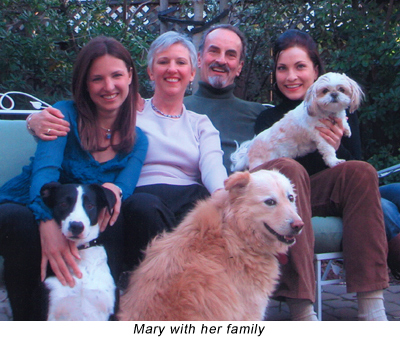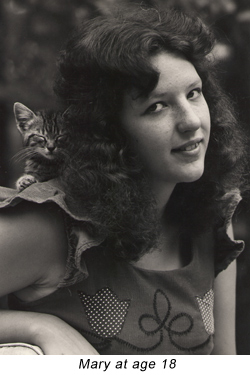
Location: Shenandoah Valley, California
Age: Over 50
Marital Status: Married
Education: University of Arkansas
Today, Mary is alive, in remission, and happily remarried, not to mention a successful financial advisor with Raymond James. Meet Mary and find out how she fought back from a failing marriage and a frightening illness.
How did you find out about the lymphoma?
“I didn’t feel great for a long time, but I just kept pushing myself, as many professional women do. I went to doctors and they didn’t know what was wrong, so I was sure it was nothing serious. And I did that for ten years.”
You didn’t feel well for ten years?
“Yeah. Doctors would ask if I had stress in my life and I’d say ‘yes, I’m a financial advisor,’ and it went on and on like this.”
Scary.
“My massage therapist finally found it. She was massaging my abdomen, she stopped the massage and she said, ‘I’m telling you, something is wrong, this does not feel right to me.’ Of course, she was right. By this time I couldn’t eat anymore.”
That’s shocking. You must be a very positive thinker not to have pressed your doctors earlier.
“Well, I learned that the hard way. I learned that you have to be your own advocate. It had been getting worse and worse.”
You must have been frightened when you found out.
“I had never heard of lymphoma until then. I was lucky in a certain sense because if it had been diagnosed five years earlier, they didn’t have the drug Rituxan. Before Rituxan, the recurrence rate was high. Patients had chemotherapy but the disease recurred within two years. Now rates of recurrence are much lower.”
Had your lymphoma metastasized?
“It was everywhere. I had about 50 tumors, but it wasn’t in my bone marrow. Once it’s in your bone marrow, then you’re stage IV and that’s pretty tough. But I do believe in positive thinking and I had tremendous support from my friends.”
In what way did the chemotherapy affect you, physically and psychologically?
“Chemotherapy is all about surrender. Everybody is going to be poking you, prodding you, and your privacy is gone. I didn’t work for probably seven or eight months. I was totally wiped out. There’s no way I could have worked.”
And slowly you saw that it was getting better?
“Yeah. It took a long time. They told me that they felt that maybe it would take four rounds of chemotherapy. But after four rounds it wasn’t working so they go two more rounds and that wasn’t good enough. So I actually went eight rounds and I kept thinking, ‘I can make it, I can do this.’ Eight rounds is all they can do, then you wait.”
Thank God, the chemotherapy worked.
“Yes, although they didn’t know at the time how long I’d stay in remission or if they could cure lymphoma.”
What do they say now?
“I was among that early group so the results are still coming in. Some people have recurrences, but some don’t. “
Tell me how your family reacted when you were first diagnosed?
“My daughter, bless her heart, was in the Peace Corps, stationed in Honduras. When I called to tell her, she just burst into tears and said, ‘Mommy, I’m coming home.’”
Where did you grow up?
“ My dad was in the Air Force so we moved around all the time. No place fun, places like Newfoundland and Orlando.”
How long have you been remarried and how did you meet?
“We’ve known each other for 25 years. We married four years ago. I had come to the point in my previous marriage where I knew I had to get out. I didn’t care if I was on my own for the rest of my life.”
What does your husband do?
“He’s Director of Development for Clausen House, an organization that provides independent living and programs for developmentally disabled adults in the San Francisco Bay Area. They have three residence houses and a big independent living program. Many of the residents are in their fifties and sixties and came into Clausen when they were in their teens.
“One of their programs, called Dance for all Abilities, is close to my heart because I was a dancer. That class is no kidding. It’s headed by Eric Coopers, an incredibly encouraging man. Through dance, the adults learn to make decisions and to express themselves. Classes have fully functioning dancers, dancers in wheel chairs and dancers who are developmentally disabled.”
Did you major in dance in school?
“I majored in music at the University of Arkansas. I played the piano but mostly sang. I wanted to be on Broadway so I came to New York alone with my young daughter when I was in my late twenties. I was a starving artist but figured I had to get a real job, so I took typing.”
What happened?
“I stayed in New York for six months and then I moved to California in 1983, when I was 28. It was the beginning of the big bull market and a friend told me that Merrill Lynch needed a receptionist. The minute I walked into the office I knew I wanted to be in finance, even though I didn’t know a thing about the market.
There were no women advisors but after I talked to a man who had just become the branch manager, he gave me an aptitude test, hired me on the spot and put me on the phone.”
Did you raise your daughter alone?
“She lived both with me and her father in the Shenandoah Valley. Now she’s going to marry a man named Shenandoah. She grew up saying the word. Isn’t that amazing?”
What were you like when you were younger?
“When I was 18, I traveled across the country in a van. I was a hippie. We moved to Pennsylvania and built a log cabin ourselves by scratch.
“I’ve been a spiritual seeker my whole life. When I was little I totally loved Jesus and loved church. At 15, I was like, ‘I hate the church, I hate religion.’ So I was searching for it. Now I’m a member of a church called Sufism Reoriented that follows an Indian spiritual leader called Meher Baba.
Is it like Buddhism?
“The basic precept is that love alone is real and that everyone is on the path toward divinity.
Were your parents spiritual?
They were Southern Baptist and were very open-minded people.
How long did you stay at Merrill Lynch?
“I was there for seven years, but even though I had my own clients and built my own business, everyone still thought of me as an assistant. So I moved to Paine Webber for five years, and then to Smith Barney for 15 years.
Then Raymond James courted me. When I interviewed with Tom James, whose father started the company, he told me the man he admired most on Wall Street was Jamie Dimon (currently Chairman of JP Morgan Chase), which I liked.”
How do you get clients?
“Almost always through referrals. When I moved to Raymond James, I decided to make my niche professional and executive women. This is the clientele who I identify with and need me the most.”
What is your favorite book?
“One of my favorites: is Autobiography of Eleanor Roosevelt. We forget the incredible obstacles she had to overcome to be taken seriously as a woman in those times.”
What is your favorite restaurant?
“Fleur de Lys… it’s a French restaurant in San Francisco. My husband and I loved our time in Paris, and I surprised him with a dinner there.”
Who inspires you and why?
“Nurses and those who cheerfully and lovingly care for the elderly. Everything they do is simply for the sake of love.”
What’s your skin care routine?
“I use B. Kamins – it smells good!”
Who influenced you most and why?
“My mother; she taught me that how you treat people is the most important attribute in a career. And my Dad; he tried to tell me there were certain things women just couldn’t do. (That built drive!)”

